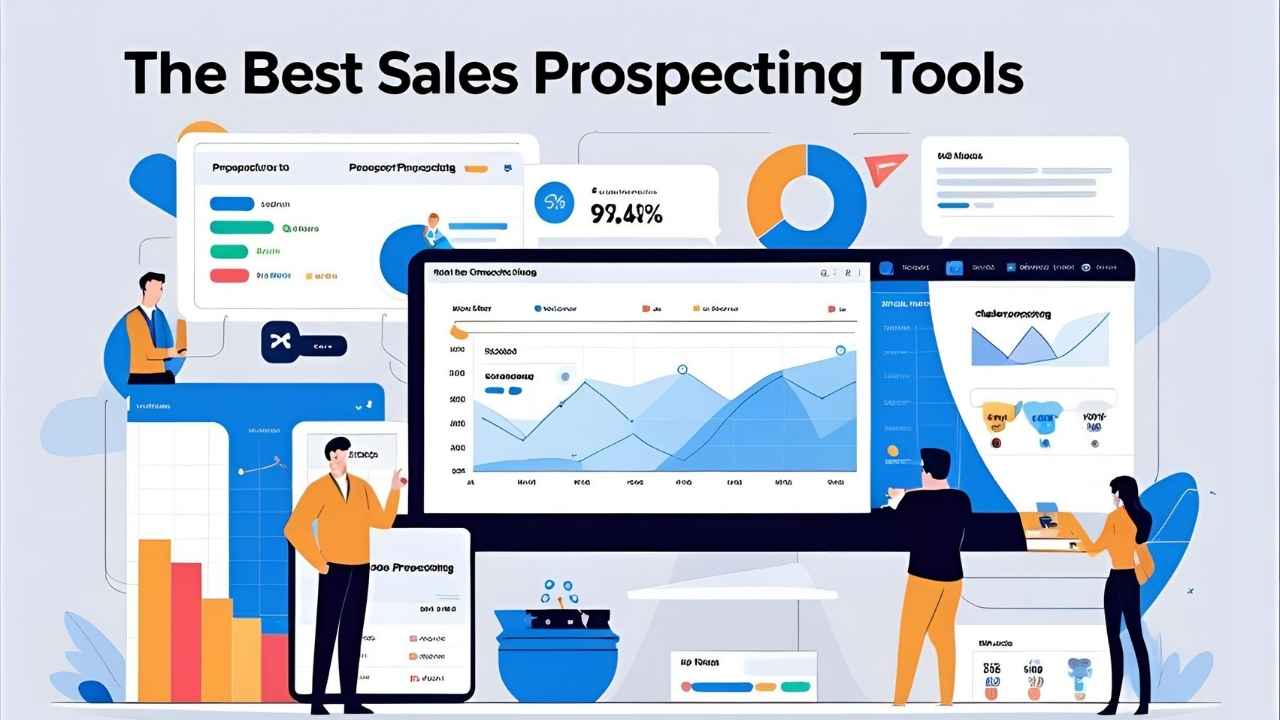In the context of sales, prospecting tools are tools that are now indispensable to any modern sales team that wants to identify, reach out, and close high-quality leads in an efficient manner. As competition increases and personalized outreach is expected, these tools allow salespeople to optimize workflow and get up-to-date contact information as well as automate follow-ups – improving productivity and close rates. This is the list of the best 10 sales prospecting tools which are selected and maintained by sales representatives, business development managers, marketers, recruiters, and start-up founders whose primary lead generation efforts are proactive.
The list has been chosen due to its compliance with such essential criteria as the accuracy of data provided, CRM integration, adherence to privacy rules, ease of use, support of multichannel outreach, automation opportunities, and low cost. Belong to a big company or a small startup? The right tool can mean a world of a difference in your sales pipeline. This software enables users to work more efficiently, minimize manual work, and establish meaningful relationships with prospects at a scale.
Criteria for Selecting the Best Sales Prospecting Tools
The following are the main criteria for choosing the best sales prospecting tools:
- Data accuracy and quality: The tool must also offer current and verified contact and company data to reduce bounce rates and guarantee the success of the outreach.
- Search and filtering capabilities: Further filtering (by industry, job title, company size, location, and so on) will allow you to specify your dream target audience quickly.
- CRM integration: It can be smoothly integrated with the most popular CRMs, such as Salesforce, HubSpot, and Zoho, to manage leads and automatize the process.
- Compliance and data privacy: Ensure the platform can prospect internationally and safely to legally comply with data privacy regulations (GDPR, CCPA).
- Ease of use and UI/UX: Its convenient interface allows the tool to be used effectively even by sales teams that do not require advanced training.
- Multichannel outreach support: The use of many engagement strategies within a single platform is available through email, phone, LinkedIn, and SMS support.
- Lead scoring and intent data: The tools that have the intent signals or the predictive scoring would be able to help prioritize the high-value prospects.
- Email verification and deliverability: Native email validation ensures that contacts are valid to increase the effectiveness rate of your campaigns.
- Automation and workflow efficiency: The automation feature of scheduling, follow-ups, and sequence management improves productivity and consistency.
- Scalability and pricing: Choose a tool depending on the size of your business, and one that will be able to support your business prospecting needs as they grow, and whose prices are not secretive.
List of Top 10 Sales Prospecting Tools
Here’s a detailed breakdown of the top 10 sales prospecting tools including short descriptions, key features, pros & cons, pricing, and ideal users:
1. LinkedIn Sales Navigator
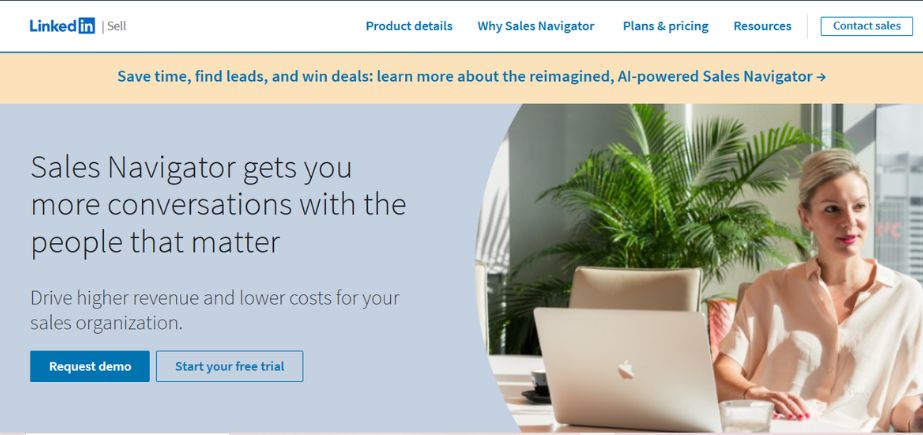
LinkedIn Sales Navigator is a paid service that assists salespeople in identifying and connecting with leads by using enhanced search filters, lead suggestions, and live updates. It allows targeted outreach to be pasted using the huge professional database of LinkedIn. Users are able to store leads, get notifications on prospect activity as well as integrate the tool with CRMs such as Salesforce. Sales Navigator provides InMail messaging, and advanced analytics to help teams of all sizes develop relationships and accelerate the sales cycle. It especially comes in handy when targeting B2B sales teams and account-based marketing approaches that want to have a personalized and data-driven outreach.
Key Features:
- Advanced search filters and lead recommendations
- Real-time sales updates and alerts
- CRM integrations (e.g., Salesforce, HubSpot)
- InMail messaging
- TeamLink for warm introductions
Pros:
- Massive database of professionals
- Easy to target specific industries and roles
Cons:
- Expensive for small teams
- Limited integration flexibility outside major CRMs
Pricing:
Starts at $99.99/month per user
Who should use it?
B2B sales reps, enterprise sales teams, and recruiters targeting professionals across industries.
Related Blog: Best LinkedIn Marketing Tools and Best LinkedIn Scraping Tools
2. ZoomInfo
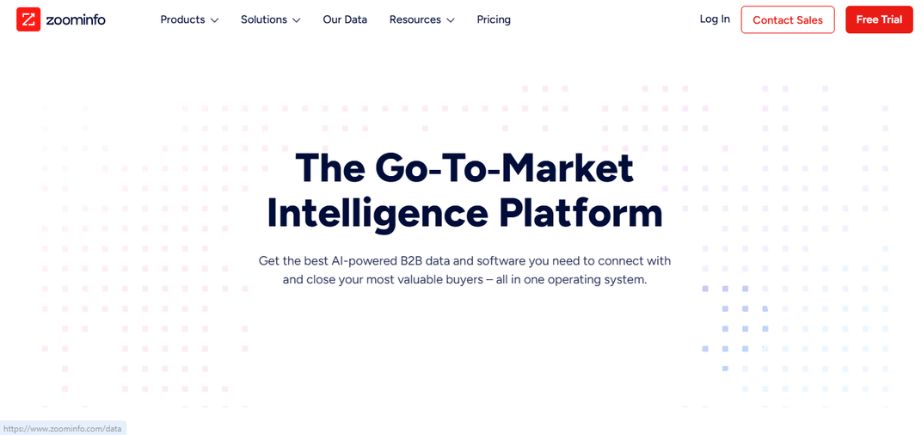
ZoomInfo is a B2B intelligence platform that gives access to millions of verified contact records, company information, and intent data. It assists sales teams in establishing the perfect customers, and their behavior and targets them accurately. It has segmentation, leads scoring, and real-time alert tools, which guarantee quality prospecting and conversion rates. Popular CRM and marketing automation systems are also integrated into the platform, making workflow efficiency a possibility. ZoomInfo is particularly useful when sales teams (of an enterprise level) want to prospect at scale and connect with decision-makers in a short amount of time.
Key Features:
- Company and contact database
- Intent data and predictive scoring
- Conversation and engagement tracking
- CRM and marketing platform integrations
- Org charts and buying committees
Pros:
- Accurate and detailed contact data
- Rich intent signals help prioritize leads
Cons:
- High pricing
- Learning curve for new users
Pricing:
Custom pricing (based on seats, features, and data volume)
Who should use it?
Mid to large B2B sales and marketing teams focused on data-driven prospecting.
3. Apollo.io
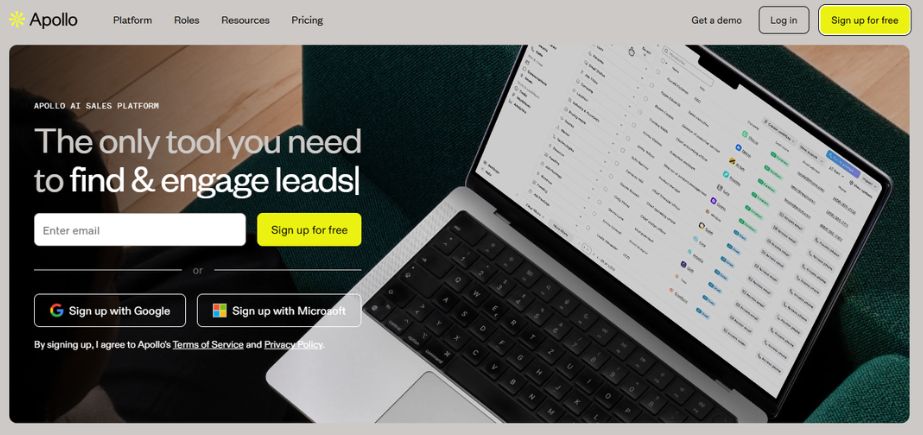
Apollo.io is a sales engagement platform that integrates lead generation, email automation, and CRM capabilities in one tool. It allows one to find proven contact data, create segmented lists, and conduct outreach campaigns across multiple channels. The analytics and A/B testing capabilities of Apollo help to optimize the performance of emails, and the possibility of integrations with such tools as Salesforce and HubSpot allow streamlining operations. The platform allows complex search filters, activity logging, and real-time engagement analytics. Apollo.io is the sales quality appetite of sales teams, startups, and SMBs, assisting them to achieve steady pipeline development by performing personalized, scalable prospecting.
Key Features:
- Contact and company database
- Email sequences and A/B testing
- Task automation and CRM sync
- LinkedIn engagement tools
- Enrichment and lead scoring
Pros:
- Affordable all-in-one solution
- Powerful automation features
Cons:
- Occasional data inaccuracies
- Can feel complex for beginners
Pricing:
Free plan available; paid plans start at $49/user/month
Who should use it?
SMBs, startups, and SDRs looking for a cost-effective sales prospecting suite.
4. Hunter.io
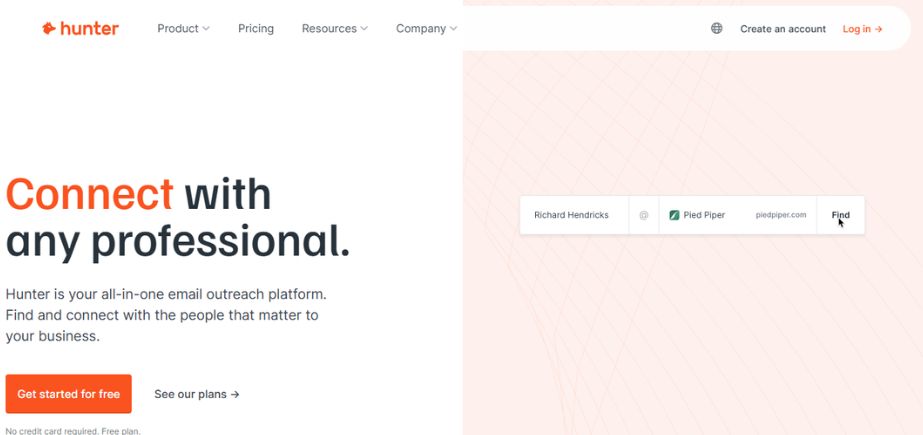
Hunter.io makes the search and validation of professional emails easy. The search can be performed by domain, company name, or individual, so it is also useful in cold outreach and list building. Email Verifier by Hunter helps to guarantee delivery by verifying the correctness and activity of email addresses. It otherwise provides marketing campaign management tools such as templates and email monitoring. Hunter is a lightweight, CRM and outreach-integrated tool that allows freelancers, marketers, and salespeople to reach out to their prospects effectively.
Key Features:
- Domain search for company emails
- Email verifier
- Chrome extension for fast lookup
- Bulk tasks and API access
- Campaigns for email outreach
Pros:
- Easy to use
- High email accuracy
Cons:
- Limited prospecting data beyond email
- Not ideal for high-volume outreach
Pricing:
Free plan; paid plans start at $34/month
Who should use it?
Freelancers, consultants, and small sales teams needing verified email contacts.
5. Cognism
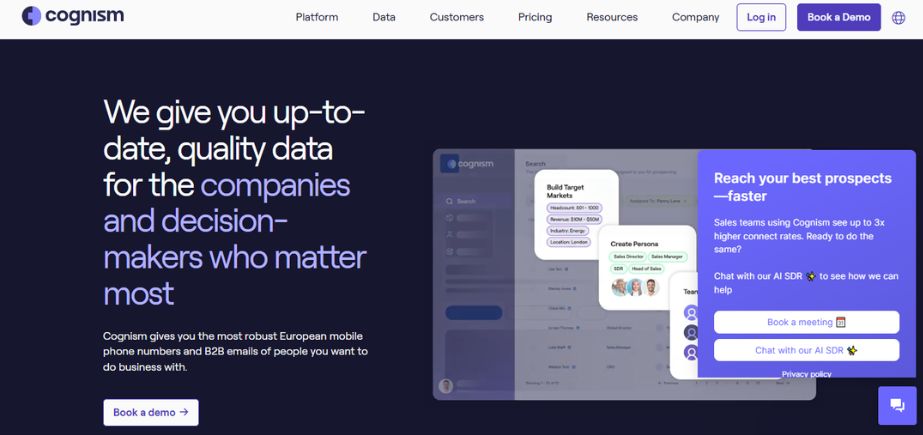
Cognism is a sales intelligence platform that provides GDPR and CCPA-compliant contact data, enriched with intent data and technographics. It assists sales and marketing teams in detecting high-intent leads and contacting them using the right mobile numbers and emails. Cognism is also characterized by intent-driven targeting, lead enrichment as well as native CRM integrations. Its international data coverage and regulatory conformity qualify it to be used by businesses with multi-territorial operations. The platform especially comes in handy when teams want to reduce sales cycles, enhance the effectiveness of their outreach, and establish regulatory compliance on their prospecting workflow.
Key Features:
- Global contact and company database
- Intent and event signals
- Diamond Data verification
- CRM and outreach platform integrations
- Compliance with GDPR & CCPA
Pros:
- High data accuracy
- Focus on compliant prospecting
Cons:
- Premium pricing
- Limited market awareness in some regions
Pricing:
Custom pricing
Who should use it?
International B2B sales teams focused on compliance and high-quality targeting.
6. Clearbit
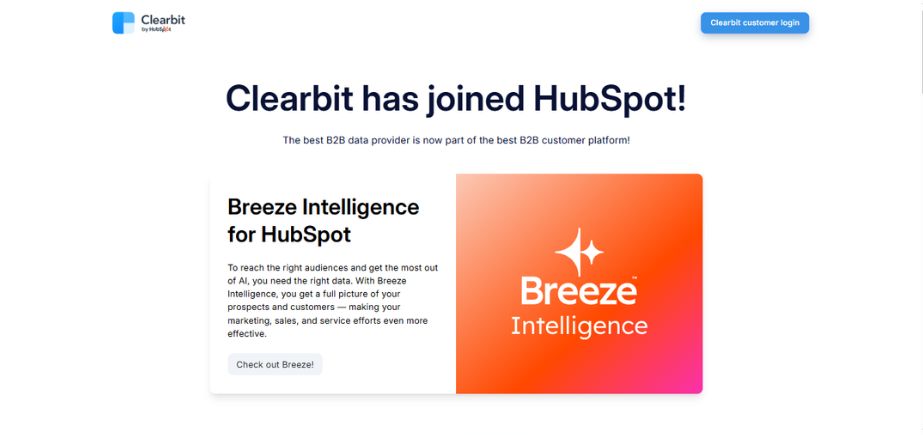
Clearbit boosts sales prospecting by enhancing leads in real-time with firmographic, demographic, and technographic information. It retrieves data on more than 100 open and owned data sources to reveal a comprehensive image of opportunities. Clearbit Reveal, specifically, is a feature that determines anonymous visitors to your site and associates them with companies so that you can reach out in time. Salesforce, HubSpot, and Slack integrations allow sales reps to receive alerts and enrich data automatically. It is perfect to fit the needs of B2B companies that wish to make the process of communication personal, split audiences, and maximize lead generation on the basis of company-level intelligence.
Key Features:
- Real-time data enrichment
- Company intelligence and segmentation
- Reveal for anonymous web traffic identification
- CRM and marketing integrations
- API for custom workflows
Pros:
- High-quality enrichment
- Useful for lead scoring and routing
Cons:
- Less suited for full prospecting
- Expensive for small companies
Pricing:
Custom pricing
Who should use it?
Marketing and RevOps teams seeking advanced enrichment and segmentation capabilities.
7. Lusha
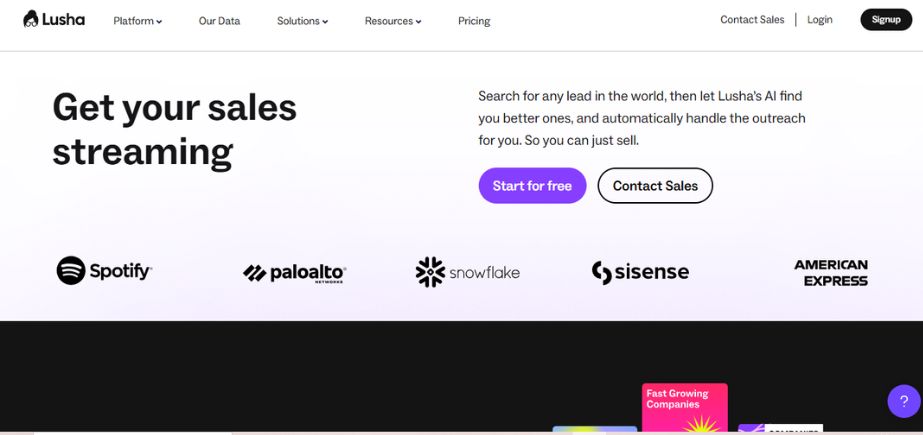
Lusha is a sales intelligence platform that provides enriched contact data, such as emails and direct dials, to prospects quickly and reliably. It is connected with LinkedIn, CRMs, and outreach tools, so it is simple to capture and manage prospect data in real-time. The Chrome extension by Lusha enables discovering leads in real time when viewing a LinkedIn profile or a company site. It has a reputation for being easy to use and highly accurate, especially among sales development representatives (SDRs), recruiters, and marketers who want to get up and running with high-quality B2B contact data without having to go through a complex setup process.
Key Features:
- Chrome extension for LinkedIn and websites
- B2B contact database
- Contact enrichment
- Salesforce and HubSpot integrations
- Real-time verification
Pros:
- Simple and fast to use
- Highly accurate direct dials
Cons:
- Limited search functionality
- Credits can get used up quickly
Pricing:
Free plan; paid plans start at $22.45/user/month
Who should use it?
Sales reps and recruiters needing fast access to direct contact info.
8. Crunchbase
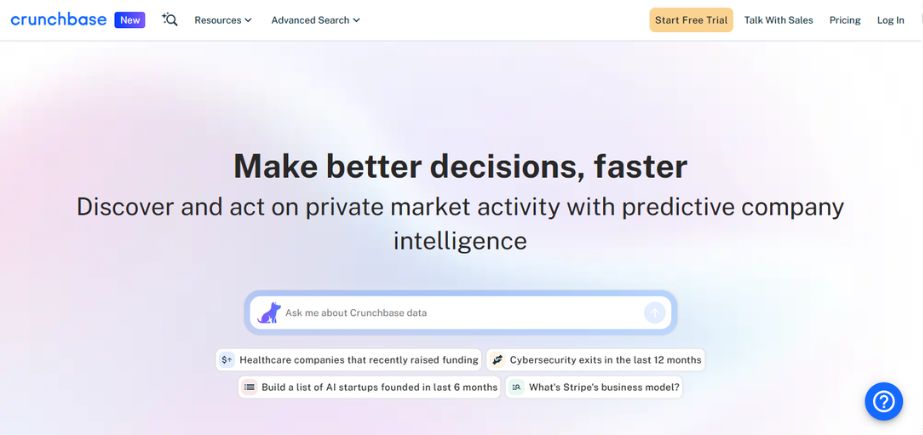
Crunchbase is a business information platform that allows people to explore innovative companies, influential executives, and financing information. Sales and business development teams use it extensively to discover high-growth startups, monitor trends in the industry, and generate leads. Crunchbase offers advanced targeting of companies by location, funding stage, revenue, and other filters. The platform can connect with Salesforce and has the option of daily alerts on new opportunities. They can particularly utilize it in venture-backed sales prospecting and partnership discovery as well as market research within the tech and startup ecosystems.
Key Features:
- Company profiles with funding and acquisition data
- Contact finder
- Advanced search and filters
- Custom alerts and lists
- CRM integrations
Pros:
- Great for startup prospecting
- Detailed company and funding info
Cons:
- Limited contact details in basic plans
- Focused more on company data than individuals
Pricing:
Free version; paid plans start at $79/month
Who should use it?
VCs, business development reps, and enterprise tech sellers targeting startups.
9. UpLead
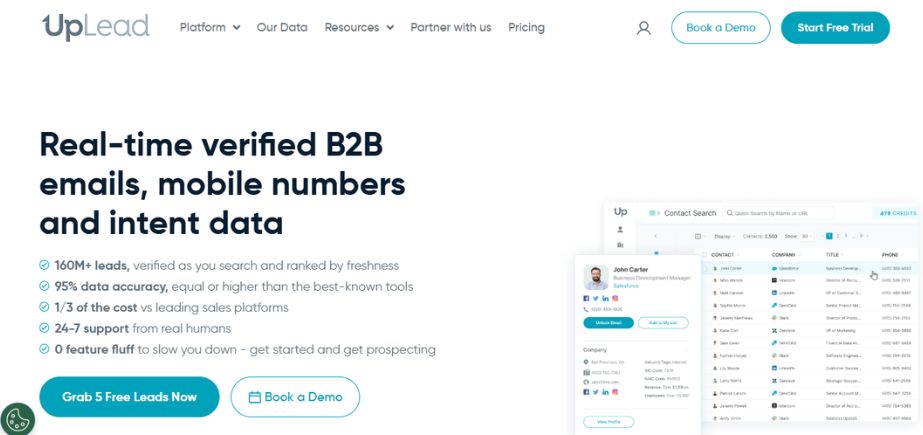
UpLead is a business-to-business lead generation platform that provides access to real-time verified business contacts and company databases. The users may search through job titles, industry, company size, location, and other filters to create refined lead lists. UpLead also has integrated email verification, which guarantees high deliverability and lowers bounce rates when performing outreach. It is also integrated with popular CRM and outreach tools to fit into the workflow. UpLead is recommended to small to mid-sized sales teams and is considered to have accurate data, low prices, and an easy-to-use interface that facilitates prospecting.
Key Features:
- Verified B2B contact data
- Advanced search filters
- CRM integrations
- Technographics and firmographics
- Email verification and exports
Pros:
- 95%+ data accuracy guarantee
- Clean interface with instant filtering
Cons:
- Smaller database than top competitors
- Limited outreach capabilities
Pricing:
Starts at $99/month for 200 credits
Who should use it?
SMBs and outbound sales teams needing reliable lead lists.
10. Reply.io
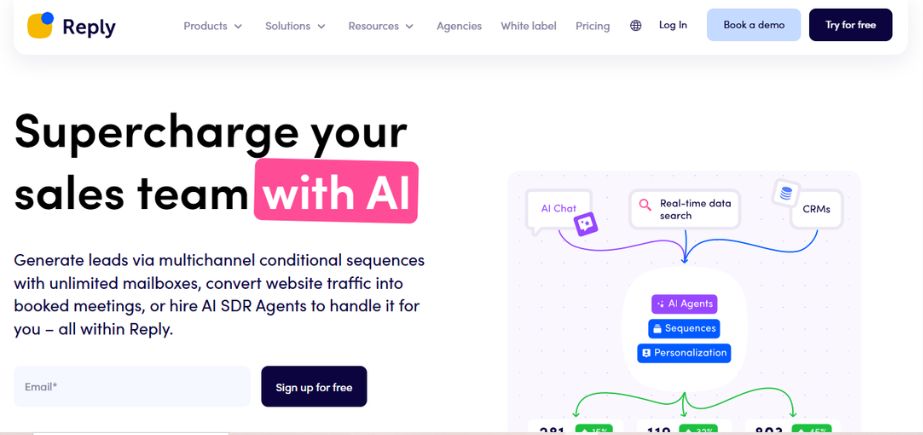
Reply.io is a sales engagement tool to automate multichannel outbound email, phone, LinkedIn, and SMS. It enables sales reps to create and run prospecting sequences and monitor performance, and responses management all at a single location. The tool has such features as A/B testing, analytics, contact discovery, and connection to CRMs, such as Salesforce and HubSpot. Its artificial intelligence email assistant can assist in optimizing messaging and scheduling. Reply.io would be a perfect fit if you are an outbound sales team that aims to automate its processes, add personalization to the outreach at scale, and achieve higher response rates in an efficient manner.
Key Features:
- Email sequences with A/B testing
- LinkedIn automation
- Email finder and verification
- Call tasks and analytics
- CRM integrations
Pros:
- Great for scaling outreach
- Excellent automation and reporting
Cons:
- Learning curve for new users
- Integration setup can be technical
Pricing:
Starts at $89/month per user
Who should use it?
Outbound sales teams and SDRs seeking multichannel prospecting automation.
Comparison Between Best Sales Prospecting Tools
Here’s a comparison table of the top 10 sales prospecting tools based on features, pricing, use cases, and website links:
| Tool | Key Features | Pricing (Starting) | Best For | Website |
| LinkedIn Sales Navigator | Advanced lead search, InMail, CRM integration, TeamLink | $99.99/month | B2B sales, recruiters, enterprise sales | sales.linkedin.com |
| ZoomInfo | Intent data, org charts, contact info, conversation insights | Custom pricing | Data-driven B2B sales teams | zoominfo.com |
| Apollo.io | Email automation, CRM sync, prospecting tools, LinkedIn features | $49/user/month | Startups, SMBs, SDRs | apollo.io |
| Hunter.io | Email finder, verifier, Chrome extension, campaigns | $34/month | Freelancers, small sales teams | hunter.io |
| Cognism | GDPR-compliant data, intent signals, technographics, integrations | Custom pricing | International B2B teams | cognism.com |
| Clearbit | Real-time enrichment, Reveal, segmentation, API | Custom pricing | Marketing ops, RevOps teams | clearbit.com |
| Lusha | Chrome extension, direct dials, email enrichment, integrations | $22.45/user/month | Sales reps, recruiters | lusha.com |
| Crunchbase | Startup data, funding info, filters, alerts, contact finder | $79/month | VCs, tech sellers, business development reps | crunchbase.com |
| UpLead | Verified B2B data, technographics, email verifier, CRM integrations | $99/month (200 credits) | Outbound sales, SMBs | uplead.com |
| Reply.io | Email + LinkedIn outreach, call tasks, CRM sync, analytics | $89/user/month | SDRs, outreach-focused sales teams | reply.io |
Conclusion
Sales prospecting tools can be a valuable asset when it comes to the construction and maintenance of an effective sales pipeline. ZoomInfo and Cognism are the best options when it comes to advanced B2B targeting and top insights, particularly for enterprise sales teams. LinkedIn Sales Navigator is great when it comes to relationship-based prospecting, whereas Apollo.io and Reply.io are a perfect fit when a startup needs an all-in-one outreach and automation tool. Hunter.io and Lusha are the tools to serve the community that require fast and proper contact data at an affordable price.
UpLead is brilliant to use in small to mid-sized teams that value the accuracy of data, and Crunchbase is best in market research and prospecting startups. Clearbit specializes in real-time data enrichment and personalized targeting. The ideal tool will always come down to your own sales process, number of reps, and outreach efforts. Focussed on proven contact information, multichannel outreach, or willingness to connect with your current CRM – these tools accommodate most prospecting requirements and business objectives.
FAQs
1. What are sales prospecting tools?
Sales prospecting tools refer to software platforms that assist sales teams with identifying, researching, and reaching out to potential customers. They are used to simplify the process of lead generation and offer contact information, email outreach, CRM integrations, and analytics on their performance.
2. What are the ways in which sales prospecting tools enhance sales?
They can automate manual processes and save time, enrich lead quality with verified data, and support personalized, multichannel outreach- which leads to an increase in response rates and reduces sales cycles.
3. Can sales prospecting tools be used by small companies?
Yes, there are tools with scale pricing and startup or small sales team features. Particularly affordable are such tools as UpLead, Hunter.io, and Apollo.io.
4. Do the tools have the ability to integrate with my current CRM?
The majority of recent sales prospecting tools provide integrations with such popular CRMs as Salesforce, HubSpot, Zoho, and Pipedrive so that the data can be synced and leads can be managed without any problems.
5. Is the use of the prospecting tools in accordance with data privacy?
Trustful tools comply with such regulations as GDPR and CCPA. It is best to prioritize using tools that stress compliance and provide you with the option to handle opt-outs and data requests.
